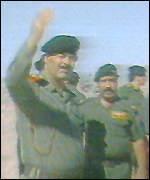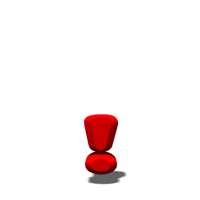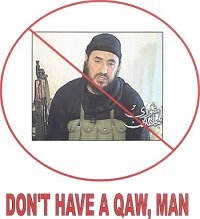Posted on April 4,
2023
Iraqi Invasion At 20
The "forever war" that wasn't
by
Daniel
Clark
Twenty years ago, the United States embarked upon one of
the most tragic and misguided military blunders in world history. Or so one would think, by listening to the
dishonest revisionists who continue to dominate the narrative. George W. Bush sent our nation to war "under
false pretenses," they tell us. Saddam
Hussein had no weapons of mass destruction, and no ties to Islamic
terrorism. It was an illegal, undeclared
war. Bush prematurely said "mission
accomplished," and then got America bogged down in a quagmire. The costly war produced little benefit, and
even made us less safe, by creating more terrorists. None of this has ever been true, yet most
people seem to believe it, for the simple reason that it's the only side of the
argument that ever gets a public hearing.
 To
hear the willfully ignorant "what we know now about Iraq" chorus tell it, this
was a war that was fought without an enemy.
In one particular omission-riddled essay published recently at Breitbart,
James Pinkerton went 24 paragraphs before even mentioning Saddam Hussein. Even then, he only did so in an indirect
reference to his supposedly nonexistent WMDs.
Countless others have conceded that Saddam was "a bad guy," while
contending that this did not justify his forcible removal, a designation that
puts the Butcher of Baghdad roughly on par with Justin Trudeau. Granted, the Iraq War does appear to have
been quite senseless if we first dismiss, among other factors, Saddam's refusal
to comply with the 1991 cease fire, his habitual funding, training and
harboring of foreign terrorists, and the VX nerve agent discovery that
precipitated "Operation Desert Fox." But why in the world should we do that?
To
hear the willfully ignorant "what we know now about Iraq" chorus tell it, this
was a war that was fought without an enemy.
In one particular omission-riddled essay published recently at Breitbart,
James Pinkerton went 24 paragraphs before even mentioning Saddam Hussein. Even then, he only did so in an indirect
reference to his supposedly nonexistent WMDs.
Countless others have conceded that Saddam was "a bad guy," while
contending that this did not justify his forcible removal, a designation that
puts the Butcher of Baghdad roughly on par with Justin Trudeau. Granted, the Iraq War does appear to have
been quite senseless if we first dismiss, among other factors, Saddam's refusal
to comply with the 1991 cease fire, his habitual funding, training and
harboring of foreign terrorists, and the VX nerve agent discovery that
precipitated "Operation Desert Fox." But why in the world should we do that?
Gulf War wasn't over
A state of war had technically still existed between
the United States and Iraq since 1991, because there had never been a treaty
ending it, but only a cease-fire, the conditions of which Saddam immediately
and habitually disobeyed. The terms
required him to report all of his weapons of mass destruction, and then destroy
them under the supervision of the UN weapons inspectors. They did not allow him to hide the weapons,
to secretly destroy them or transport them out of the country, or to physically
obstruct and repeatedly attempt to bribe the weapons inspectors. In addition to these WMD-related violations,
he routinely fired upon American and allied aircraft. Before we even proceed any farther than this,
his removal was already totally justified.
According to the "unilateral destruction" hypothesis
that is favored by the what-we-know-nowers, Saddam
rounded up all the chemical and biological weapons in his country in a moment
of panic in 1991, and blasted them to smithereens with a couple air-to-surface
missiles, all while avoiding detection by the weapons inspectors. Not only is this just plain dopey on its
face, but it steps all over the WMD timeline.
It was already known that Iraq had admitted to producing large
quantities of ricin in the mid-90s, and had been caught weaponizing VX in
1998. It is not also possible that its
WMD programs were dismantled in 1991 and never revived since.
"Smoking gun" snipe hunt
The weapons inspectors were tasked with overseeing
Iraq's destruction of its own WMDs, and reporting all material breaches of the
terms of the cease-fire. It was not to
go on a snipe hunt for some mythical object called a "smoking gun," to be
subjectively defined by those who wished them to fail. Deliberately obtuse United Nations weapons
inspector Hans Blix repeatedly nullified WMD discoveries by declaring, "This is
not a smoking gun," usually on the basis that the munitions predated the '91
Gulf War, and thus were presumably degraded to the point that they did not
qualify. In reality, those were the very
same weapons whose supervised destruction Saddam had promised as part of the
cease-fire.
 In
accordance with the 1997 International Chemical Weapons Convention, the United
States is expected to complete the destruction of its chemical weapons stocks
sometime this year. These Cold War-era
weapons were also produced no later than 1991, yet their destruction is
necessarily a long and laborious process.
We can't just scrape them into a gigantic pile and blow them up. Nor are they presumed to be inert and
therefore nonexistent just because they were created so long ago. To excuse Saddam for hundreds of sarin and
mustard gas bombs on that basis runs contrary to the way the UN treats chemical
weapons throughout the entire world outside of Iraq.
In
accordance with the 1997 International Chemical Weapons Convention, the United
States is expected to complete the destruction of its chemical weapons stocks
sometime this year. These Cold War-era
weapons were also produced no later than 1991, yet their destruction is
necessarily a long and laborious process.
We can't just scrape them into a gigantic pile and blow them up. Nor are they presumed to be inert and
therefore nonexistent just because they were created so long ago. To excuse Saddam for hundreds of sarin and
mustard gas bombs on that basis runs contrary to the way the UN treats chemical
weapons throughout the entire world outside of Iraq.
Not that Saddam stopped producing WMDs at the end of
the Gulf War. In addition to the VX
discovery and the ricin admission, "WMD components" were also found, but have
not been officially acknowledged as WMDs.
Our forces recovered large quantities of each of the two chemicals that
are combined to create sarin, and also binary warheads that are specifically
designed to blend those two chemicals while airborne. According to the evasive semantic rules that
had been set, those "components" would not become full-fledged WMDs until the
warheads were filled with the chemicals, mounted on missiles, and then launched,
thereby combining the chemicals into sarin.
If you've been under the impression that there were no chemical weapons
in Iraq, is this what you thought that meant?
On multiple occasions, our soldiers were treated for
exposure to deadly chemicals in Iraq, but this was dismissed on the basis that
they were dual-use chemicals that could have either been weaponized, or used
for innocent civilian purposes like making pesticides. Although the chemicals were found in
camouflaged ammunition dumps, the what-we-know-nowers
have eagerly drawn this latter conclusion.
The Duelfer Report (a.k.a.,
the Iraq Survey Group Report) includes an explanation from one of Saddam's
officers that he had modernized his chemical weapons program so that he could
produce small stocks as he needed them, which is why our forces did not find
large stockpiles of recently made WMDs.
The report strangely pays only fleeting attention to this information,
even though it treats other, less substantiated statements from Saddam and his
representatives with remarkable credulity.
In truth, this is a conclusion we should have drawn for ourselves,
without any direct input from a member of the enemy regime.
Dual-use duplicity
In 2004, the UN Monitoring, Verification and
Inspection Commission (UNMOVIC) made a presentation to the UN Security Council
in which spokesman Ewan Buchanan showed before-and-after pictures of Iraqi
missile sites that had been hastily dismantled before the invasion. Buchanan reported that the inspectors had
found dual-use equipment at the sites that could have been used to produce
chemical or biological weapons. "You can
make all kinds of pharmaceutical and medicinal products with a fermenter," he
said. "You can also use it to breed
anthrax." Once again, the most generous
assumption possible has been made about Saddam's dual-use materials, in direct
contradiction of the context in which they were found.
 This
revelation demonstrated not only the existence of the dual-use equipment, but
also the fact that Saddam had decided to conceal his WMD programs rather than
use them in a vain attempt to defeat the United States militarily. Considering that President Bush had given him
14 months' warning (rather than "rushing to war" as he was accused of doing),
it only stands to reason that the inspectors did not find the large stockpiles
of WMDs that had been expected when everyone assumed that Saddam would stand
and fight. Nevertheless, in addition to
those weapons that were found but dismissed for various reasons, an abundance
of circumstantial evidence was uncovered.
This
revelation demonstrated not only the existence of the dual-use equipment, but
also the fact that Saddam had decided to conceal his WMD programs rather than
use them in a vain attempt to defeat the United States militarily. Considering that President Bush had given him
14 months' warning (rather than "rushing to war" as he was accused of doing),
it only stands to reason that the inspectors did not find the large stockpiles
of WMDs that had been expected when everyone assumed that Saddam would stand
and fight. Nevertheless, in addition to
those weapons that were found but dismissed for various reasons, an abundance
of circumstantial evidence was uncovered.
In an interview with NBC anchor Tom Brokaw, also in
2004, U.S. weapons inspector David Kay reported the finding of a paper trail of
Iraqi government documents that included records of the procurement of WMD
components from foreign sources, and progress reports from Saddam's
scientists. Although Kay would later
become frustrated by the lack of weapons findings to support the documentation,
he did not retract what he had told Brokaw.
Furthermore, he had testified to Congress on October 2, 2023 that the
Iraqis had been continuing research on the weaponization of ricin, aflatoxin,
and Congo Crimean Hemorrhagic Fever.
Anybody who bothers to read any substantial portion of
the Duelfer Report will be startled to find that it
does not illustrate that Iraq had no WMDs, but instead plainly states many
facts that the public has been led to disbelieve. There's a whole section, for example,
detailing Saddam's clandestine network of mobile chemical laboratories, the
existence of which is commonly thought to have been debunked. Like so many of the other chemical
discoveries, these facilities must have been presumed to have an innocent
civilian purpose. An innocent,
clandestine, mobile, civilian purpose, that is.
Mouths open, case closed
Even the most dedicated contrarian should have been
persuaded by the three secret recordings of Saddam's that were made public in
2006. In the first of these, he met with
two of his scientists to discuss a new method of uranium enrichment. At the time of this conversation, he was
still in possession of those 500 tons of uranium that our forces successfully
captured and whisked out of the country after the invasion. It is apparently true that he was a long way
from weaponizing this material, but his intention to do so is beyond serious
doubt.
The second recording featured Saddam and one of his
aides daydreaming about how easy it would be for a small number of terrorists
to poison a water supply in Britain or the United States. Perhaps this was idle speculation, but it
deserved to be taken seriously, coming from a tyrant who had a Putin-like
penchant for poisoning his political enemies.
 In
the third of these recordings, Hussein Kamel, son-in-law of Saddam Hussein and head
of his chemical weapons program, boasted about how completely they had fooled
the weapons inspectors about their chemical weapons stocks and
capabilities. "We did not reveal all
that we have," he said. "Not the type of
weapons, not the volume of the materials we imported, not the volume of the
production we told them about, not the volume of use. None of this was correct. They don't know any of this." It's hard to imagine how this could possibly
be explained away, which is probably why nobody has bothered. The what-we-know-nowers
have simply opted to ignore it.
In
the third of these recordings, Hussein Kamel, son-in-law of Saddam Hussein and head
of his chemical weapons program, boasted about how completely they had fooled
the weapons inspectors about their chemical weapons stocks and
capabilities. "We did not reveal all
that we have," he said. "Not the type of
weapons, not the volume of the materials we imported, not the volume of the
production we told them about, not the volume of use. None of this was correct. They don't know any of this." It's hard to imagine how this could possibly
be explained away, which is probably why nobody has bothered. The what-we-know-nowers
have simply opted to ignore it.
WMDs were not the only rationale for invading
Iraq. They were only of such immediate
concern because we knew that the country was a prolific state sponsor of
terrorism. That's why the Duelfer Report's conclusion that the WMDs that had been
found were not "militarily significant" is irrelevant. Our concern was not that they would be used
in a military context, but that some of them might be passed along to
terrorists for attacks on civilian populations.
Up to his wrists in terrorists
Under interrogation, Saddam admitted that his Iraqi
Intelligence Service met twice with representatives of al-Qaeda, although he
denied giving them material support. If
it's actually true that he didn't fund and supply al-Qaeda directly, that's
only because he was careful enough to do it surreptitiously. According to a 2006 Senate Intelligence
Committee report, the IIS funded a group called the Army of Muhammad, which it
recognized as an "offshoot of bin Laden," and explained that its use of a
different title "can be a way of camouflaging the organization."
Another IIS document referenced "organizations that
our agency cooperates with," a list that included the Afghani Islamic Party,
which controlled the area of Afghanistan in which Osama bin Laden established
his training camp, and Egyptian Islamic Jihad, which was Ayman al-Zawahiri's
precursor to al-Qaeda.
The rest of Saddam's terrorist activities were far
less subtle. For decades, he sheltered
the most infamous terrorists in the world, including: Abu Nidal, whose Abu
Nidal Organization was a renegade faction of the PLO that perpetrated
high-profile terrorist attacks in the Middle East and Europe throughout the
1980s; Abu Abbas, hijacker of the Achille Lauro cruise ship and murderer
of wheelchair-bound American Leon Klinghoffer; and Abdul Rahman Yasin, the man
who created the explosives that were used in the 1993 World Trade Center
bombing.
 According
to The 9/11 Commission Report, Saddam even "offered bin Laden a safe
haven in Iraq" in 1999, a year after the al-Qaeda leader declared his fatwa
against the United States. Al-Qaeda in
Iraq was itself founded by Abu Musab al-Zarqawi, who naturally took refuge in
Iraq after being wounded in Afghanistan in 2001. Zarqawi had operated a terrorist training
camp that was directly funded by Osama bin Laden, who gave his support because
he shared Zarqawi's aim of overthrowing the government of Jordan.
According
to The 9/11 Commission Report, Saddam even "offered bin Laden a safe
haven in Iraq" in 1999, a year after the al-Qaeda leader declared his fatwa
against the United States. Al-Qaeda in
Iraq was itself founded by Abu Musab al-Zarqawi, who naturally took refuge in
Iraq after being wounded in Afghanistan in 2001. Zarqawi had operated a terrorist training
camp that was directly funded by Osama bin Laden, who gave his support because
he shared Zarqawi's aim of overthrowing the government of Jordan.
Saddam overtly incorporated terrorism within his own
government through his creation of the Fedayeen, a paramilitary group made up
primarily of foreign jihadists, which circumvented the military hierarchy by
reporting only to the dictator's sadistic son, Uday. It was from the Fedayeen that Saddam selected
an elite group of terrorists for a mission he called "Operation Blessed July."
Whether this planned campaign of bombings and assassinations was ever realized
is unknown, but it involved the deployment of his ten best recruits to London
to conduct "martyrdom operations" throughout Europe.
Explosive exports
His willingness to export terrorism was already
understood before the invasion, from his very public funding of terrorist acts
against Israel. For turning one of its
members into a suicide bomber, a Palestinian family was paid as much as $25,000
by Saddam's representatives. At that
rate, the total amount of $35 million that the Iraqi government contributed to
this cause adds up to a horrifying amount of carnage.
In yet another development that should have shocked
the entire civilized world, Saddam was found to have militarized his diplomatic
corps. A 2002 document from the IIS lists the following items, which had been
stockpiled at Iraqi embassies throughout Europe and Asia: rifles with silencers
being kept at the embassy in Austria; plastic explosives in India, Thailand,
Yemen, Azerbaijan and Lebanon; conventional explosives in Pakistan, Romania and
Greece; missile launchers in Romania, the Czech Republic, Turkey, Yemen,
Azerbaijan and Lebanon; hand grenades in Austria; pistols with silencers in
Turkey; and "booby-trapped suitcases" in India, Thailand, Azerbaijan and
Lebanon. So much for the "containment
was working" theory.
If the what-we-know-nowers
would take a step back and look at what we really do know now about Iraq, they'd
see that it would have been totally pointless to wage a War on Terror while
declining to exercise our standing justification to remove this evil
regime. It might even occur to them that
this one of the "forever wars" was won quite a long time ago. You can't pinpoint the moment it happened,
and nobody is observing anything called "V.I. Day," but our forces undoubtedly
succeeded. Saddam Hussein was
hanged. His sons Uday and Qusay were hunted down and exterminated. Their government was dismantled. Its guerilla "insurgence" was routed. The defeatists' "crunch all you want, they'll
make more" view of the war turned out to be every bit as false as anything else
they've said. Iraq had become a quagmire
for the other side, not ours. By killing
the terrorists, our soldiers reduced their numbers, instead of increasing
them. Who but a sensible person would
have expected that?
By refusing to recognize what's been accomplished in
Iraq, the neo-peaceniks that now predominate both parties are committing an
offense against truth that has equally ugly secondary effects. Among those is a lack of appreciation for the
accomplishments of our military personnel, who have done so much to protect us
from Islamic terrorism that, back here on the homefront,
it's hardly even treated as a serious issue anymore. Rather than mindlessly chirping "thank you
for your service" at our veterans as if they were coffee baristas, we ought to
be sincerely thanking them for delivering to our nation a tremendous victory,
against a powerful enemy who was surpassingly devious and cruel.
The Shinbone: The Frontier of the Free Press